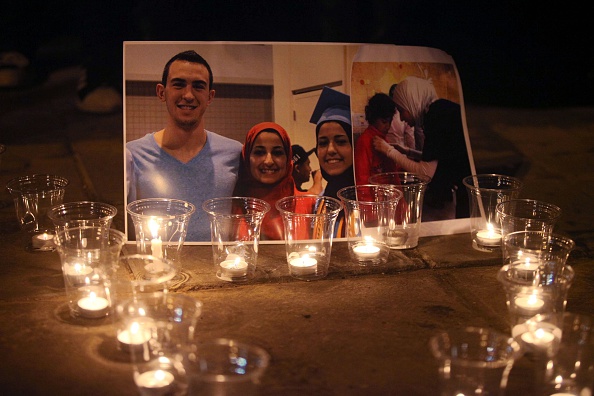
There isn’t much in the way of words that can communicate the life Yusor Abu-Salha lived. If a picture told a story of a thousand words, one could get lost for volumes in the beauty of a single wedding photo. She danced in the arms of her father, looking stunning yet modest in an all-white wedding gown. She uploaded the photo to Facebook on Feb. 9, only weeks after her wedding. She was smart, caring, ambitious and loving.
Yusor married an equally smart, compassionate, driven and loving young man, Deah Barakat. They both had a love for God and each other, a commitment to family and community and a passion for dentistry. Everyone looked up to Yusor with genuine excitement, especially her younger sister, Razan, who admired her for the role model she had become.
A year ago today—on Feb. 10, 2015—Yusor, Deah, and Razan, who was visiting her sister and brother-in-law, enjoyed a final dinner together. Within an hour, the three lay murdered in Yusor and Deah’s Chapel Hill apartment. Lives and communities were shattered.
But a hope for a better future was born. Deah Barakat, Yusor Abu-Salha and Razan Abu-Salha, now known as Our Three Winners, left a legacy of service and have inspired others through their deeds and words, a testament to the exceptional character and self-worth they displayed.
They exhibited grace in dealing with everyone they met, including their neighbors. They even mentioned how they were hoping to win over their neighbor, their accused murderer Craig Hicks, by being nice to him, despite his evident hate of their religion.
The reason we even have to engage in the agonizing process of defending their character is because of some mischaracterization of the murders as being over a “parking dispute,” even though the FBI has documented that Yusor and Razan’s cars were parked outside of the lot, and Deah’s in his designated space. This depiction overlooks the fact that after Yusor moved in with Deah, Hicks repeatedly told her he did not like how she looked because of her headscarf.
Furthermore, in today’s environment of hatred and bigotry towards Muslim Americans, citing the hateful murder of Our Three Winners as an “ongoing parking dispute” is like re-telling the story of Rosa Park’s civil rights struggle as an “ongoing dispute over a bus seat.”
A year after our loved ones’ senseless murders, we’ve been saddened to see an increase in hate crimes against our community. A dangerous climate of anti-Muslim bigotry and hate exists, which many public voices and public officials have contributed to with false claims and divisive statements.
During a time when Muslims, and those who are perceived to be Muslim, are being attacked, and Muslim community centers and places of worship are being vandalized and threatened, it is critical that we speak out against hate and call on our officials to prosecute these crimes to the fullest extent of the law.
Craig Hicks’ murder trial will begin in the coming months, and we urge the federal government to charge Hicks with a hate crime, which is unfortunately not possible under North Carolina state law.
Last Wednesday in Maryland, President Barack Obama emphasized young people in his historic first address to Muslims at an American mosque. We, too, think about the young girls inspired by Yusor on her wedding day who are now joined by girls from across America who are hopeful that our community will be successful in the struggle to freely and openly practice our faith as Muslim Americans.
It is unacceptable to allow their safety and sense of belonging to be put at risk because of an anti-Muslim climate that may yield increased TV ratings or cheap political points for public officials who make false statements about our community, but has also resulted in real loss of life for our families.
The most important action we can all take now is to get to know our neighbors—especially our Muslim neighbors. By knowing one another we can begin to overcome hate and to prevent future tragedies like the one that befell our family and community. Know your neighbor, and do unto others as you want done unto yourself.
We’re committed to honoring Our Three Winners. We know that we must not fight hate with hate. Instead, we will carry their legacy of love against hate. We hope our neighbors and our leaders will join us.
More Must-Reads From TIME
- The 100 Most Influential People of 2024
- Coco Gauff Is Playing for Herself Now
- Scenes From Pro-Palestinian Encampments Across U.S. Universities
- 6 Compliments That Land Every Time
- If You're Dating Right Now , You're Brave: Column
- The AI That Could Heal a Divided Internet
- Fallout Is a Brilliant Model for the Future of Video Game Adaptations
- Want Weekly Recs on What to Watch, Read, and More? Sign Up for Worth Your Time
Contact us at letters@time.com